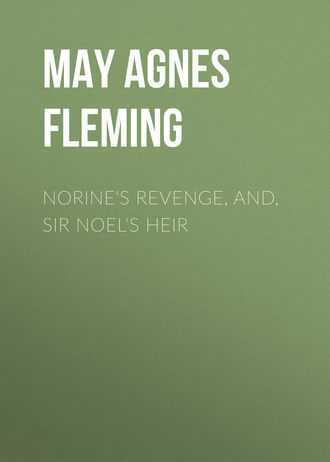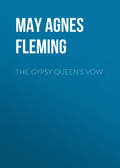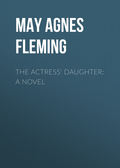
May Agnes Fleming
Norine's Revenge, and, Sir Noel's Heir
CHAPTER VI.
GUY
The rainy December day closed in a rainier night. Another day dawned on the world, sunless, and chilly, and overcast still.
It dawned on London in murky, yellow fog, on sloppy, muddy streets – in gloom and dreariness, and a raw, easterly wind. In the densely populated streets of the district of Lambeth, where poverty huddled in tall, gaunt buildings, the dismal light stole murkily and slowly over the crowded, filthy streets, and swarming purlieus.
In a small upper room of a large dilapidated house, this bad December morning, a painter stood at his easel. The room was bare, and cold, and comfortless in the extreme; the painter was middle-aged, small, brown, and shrivelled, and very much out at elbows. The dull, gray light fell full on his work – no inspiration of genius by any means – only the portrait, coarsely colored, of a fat, well-to-do butcher's daughter round the corner. The man was Joseph Legard, scene-painter to one of the minor city theatres, who eked out his slender income by painting portraits when he could get them to paint. He was as fond of his art as any of the great old masters; but he had only one attribute in common with those immortals – extreme poverty; for his family was large, and Mr. Legard found it a tight fit, indeed, to "make both ends meet."
He stood over his work this dull morning, however, in his fireless room, with a cheerful, brown face, whistling a tune. In the adjoining room, he could hear his wife's voice raised shrilly, and the cries of half a dozen Legards. He was used to it, and it did not disturb him; and he painted and whistled cheerily, touching up the butcher's daughter's snub nose and fat cheeks, and double chin, until light footsteps came running up stairs, and the door was flung wide by an impetuous hand. A boy of ten, or thereabouts, came in – a bright-eyed, fair-haired lad, with a handsome, resolute face, and eyes of cloudless, Saxon blue.
"Ah, Guy!" said the scene-painter, turning round and nodding good-humoredly. "I've been expecting you. What do you think of Miss Jenkins?"
The boy looked at the picture with the glance of an embryo connoisseur.
"It's as like her as two peas, Joe; or would be, if her hair was a little redder, and her nose a little thicker, and the freckles were plainer. But it looks like her as it is."
"Well, you see Guy," said the painter, going on with Miss Jenkins' left eyebrow, "it don't do to make 'em too true – people don't like it; they pay their money, and they expect to take it out in good looks. And now, any news this morning, Guy?"
The boy leaned against the window and looked out into the dingy street, his bright young face growing gloomy and overcast.
"No," he said, moodily; "there is no news, except that Phil Darking was drunk last night, and savage as a mad dog this morning – and that's no news, I'm sure."
"And nobody's come about the advertisement in the Times?"
"No, and never will. It's all humbug what granny says about my belonging to anybody rich; if I did, they'd have seen after me long ago. Phil says my mother was a housemaid, and my father a valet – and they were only too glad to get me off their hands. Vyking was a valet, granny says she knows; and it's not likely he'll turn up after all these years. I don't care, I'd rather go to the work-house; I'd rather starve in the streets, than live another week with Phil Darking."
The blue eyes filled with tears, and he dashed them passionately away. The painter looked up with a distressed face.
"Has he been beating you again, Guy?"
"It's no matter – he's a brute. Granny and Ellen are sorry, and do what they can; but that's nothing. I wish I had never been born."
"It is hard," said the painter, compassionately, "but keep up heart, Guy; if the worst comes, why you can stop here and take pot-luck with the rest – not that that's much better than starvation. You can take to my business shortly now; and you'll make a better scene-painter than ever I could. You've got it in you."
"Do you really think so, Joe?" cried the boy, with sparkling eyes. "Do you? I'd rather be an artist than at king – Halloo!"
He stopped short in surprise, staring out of the window. Legard looked. Up the dirty street came a Hansom cab, and stopped at their own door. The driver alighted, made some inquiry, then opened the cab-door, and a lady stepped lightly out on the curb-stone – a lady tall and stately, dressed in black, and closely veiled.
"Now who can this visitor be for?" said Legard. "People in this neighborhood ain't in the habit of having morning-calls made on them in cabs. She's coming up stairs."
He held the door open, listening. The lady ascended the first flight of stairs, stopped on the landing, and inquired of some one for "Mrs. Martha Brand."
"For granny!" exclaimed the boy. "Joe, I shouldn't wonder if it was some one about that advertisement, after all."
"Neither should I," said Legard. "There! she's gone in. You'll be sent for directly, Guy."
Yes, the lady had gone in. She had encountered on the landing a sickly young woman, with a baby in her arms, who had stared at the name she inquired for.
"Mrs. Martha Brand? Why, that's mother. Walk in this way, if you please, ma'am."
She opened a door, and ushered the veiled lady into a small, close room, poorly furnished. Over a smouldering fire, mending stockings, sat an old woman, who, notwithstanding the extreme shabbiness and poverty of her dress, lifted a pleasant, intelligent old face.
"A lady to see you, mother," said the young woman hushing her fretful baby, and looking curiously at the veiled face.
But the lady made no attempt to raise the envious screen, not even when Mrs. Martha Brand got up, dropping a respectful little servant's courtesy, and placing a chair. It was a very thick veil – an impenetrable shield, and nothing could be discovered of the face behind it but that it was fixedly pale. She sank into the seat, her face turned to the old woman behind that sable screen.
"You are Mrs. Brand?"
The voice was refined and patrician. It would have told she was a lady, even if the rich garments she wore did not.
"Yes, ma'am – your ladyship; Martha Brand."
"And you inserted that advertisement in the Times regarding a child left in your care, ten years ago?"
Mother and daughter started, and stared at the speaker.
"It was addressed to Mr. Vyking, who left the child in your charge; by which, I infer, you are not aware that he has left England."
"Left England, has he?" said Mrs. Brand. "More shame for him, then, never to let me know, or leave a farthing to support the boy."
"I am inclined to believe it was not his fault," said the clear, patrician voice. "He left England suddenly, and against his will; and I have reason to think will never return. But there are others interested – more interested than he could possibly be in the child, who remain, and who are willing to take him off your hands. But first, why is it you are so anxious, after keeping him all these years, to get rid of him?"
"Well, you see, your ladyship," replied Martha Brand "it is not me, nor likewise Ellen there, who is my daughter. We'd keep the lad and welcome, and share the last crust, we had with him, as we often have – for we're very poor people; but you see, Ellen, she's married now, and her husband never could bear Guy – that's what we call him, your ladyship – Guy, which it was Mr. Vyking's own orders. Phil Darking, her husband, never did like him somehow, and when he gets drunk, saving your ladyship's presence, he beats him most unmerciful. And now we're going to America – to New York, where Phil's got a brother, and work is better; and he won't fetch Guy. So your ladyship, I thought I'd try once more before we deserted him, and put that advertisement in the Times, which I'm very glad I did, if it will fetch the poor lad any friends."
There was a moment's pause; then the lady asked thoughtfully.
"And when do you leave for New York?"
"The day after to-morrow, ma'am – and a long journey it is for a poor old body like me."
"Did you live here when Mr. Vyking left the child with you – in this neighborhood?"
"Not in this neighborhood, nor in London at all, your ladyship. It was Lowdean, in Berkshire, and my husband was alive at the time. I had just lost my baby, and the landlady of the inn recommended me. So he brought it, and paid me thirty sovereigns, and promised me thirty more every twelvemonth, and told me to call it Guy Vyking – and that was the last as I ever saw of him."
"And the infant's mother?" said the lady, her voice changing perceptibly – "do you know anything of her?"
"But very little," said Martha Brand, shaking her head.
"I never set eyes on her, although she was sick at the inn for upwards of three weeks. But Mrs. Vine, the landlady, she saw her twice; and she told me what a pretty young creeter she was – and a lady, if there ever was a lady yet."
"Then the child was born in Berkshire – how was it?"
"Well, your ladyship, it was an accident, seeing as how the carriage broke down with Mr. Vyking and the lady, a driving furious to catch the last London train. The lady was so much hurted that she had to be carried to the inn, and went quite out of her head, raving and dangerous like. Mr. Vyking had the landlady to wait upon her until he could telegraph to London for a nurse, which one came down next day and took charge of her. The baby wasn't two days old when he brought it to me; and the poor young mother was dreadful low, and out of her head all the time. Mr. Vyking and the nurse were all that saw her, and the doctor, of course; but she didn't die, as the doctor thought she would, but got well; and before she came right to her senses, Mr. Vyking paid the doctor, and told him he needn't come back. And then, a little more than a fortnight after, they took her away, all sly and secret-like – and what they told her about her poor baby I don't know. I always thought there was something dreadful wrong about the whole thing."
"And this Mr. Vyking – was he the child's father – the woman's husband?"
Martha Brand looked sharply at the speaker, as if she suspected she could answer that question best.
"Nobody knew, but everybody thought so. I've always been of opinion, myself, that Guy's father and mother were gentlefolks, and I always shall be."
"Does the boy know his own story?"
"Yes, your ladyship – all I've told you."
"Where is he? I should like to see him."
Mrs. Brand's daughter, all this time hushing her baby, started up.
"I'll fetch him. He's up stairs in Legard's, I know."
She left the room and ran up stairs. The painter, Legard, still was touching up Miss Jenkins, and the bright haired boy stood watching the progress of that work of art.
"Guy! Guy!" she cried, breathlessly, "come down stairs at once. You're wanted."
"Who wants me, Ellen?"
"A lady, dressed in the most elegant and expensive manner – a real lady, Guy; and she has come about that advertisement, and she wants to see you."
"What is she like, Mrs. Darking?" inquired the painter – "young or old?"
"Young, I should think; but she hides her face behind a thick veil, as if she didn't want to be known. Come, Guy."
She hurried the lad down stairs, and into their little room. The veiled lady still sat talking to the old woman, her back to the dim daylight, and that disguising veil still down. She turned slightly at their entrance, and looked at the boy through it. Guy stood in the middle of the floor, his fearless blue eyes fixed on the hidden face. Could he have seen it, he might have started at the grayish pallor which overspread it at sight of him.
"So like! So like!" the lady was murmuring between her set teeth. "It is terrible – it is marvellous."
"This is Guy, your ladyship," said Martha Brand. "I've done what I could for him the last ten years, and, I'm almost as sorry to part with him as if he were my own. Is your ladyship going to take him away with you now?"
"No," said her ladyship sharply, "I have no such intention. Have you no neighbor or friend who would be willing to take and bring him up, if well paid for the trouble? This time the money will be paid without fail."
"There's Legard," cried the boy, eagerly. "I'll go to Legard's, granny. I'd rather be with Joe than anywhere else."
"It's a neighbor that lives up stairs," murmured Martha in explanation. "He always took to Guy, and Guy to him, in a way that's quite wonderful. He's a very decent man, your ladyship – a painter for a theatre; and Guy takes kindly to the business, and would like to be one himself. If you don't want to take away the boy, you couldn't leave him in better hands."
"I am glad to hear it. Can I see the man?"
"I'll fetch him," cried Guy, and ran out of the room. Two minutes later came Mr. Legard, in paper cap and shirt-sleeves, bowing very low to the grand, black-robed lady, and only too delighted to strike a bargain. The lady offered liberally – Mr. Legard closed with the offer at once.
"You will clothe him better, and you will educate him, and give him your name. I wish him to drop that of Vyking. The same amount I give you now will be sent you this time every year. If you change your residence in the meantime, or wish to communicate with me in any occurrence of consequence, you can address Madam Ada, post-office, Plymouth."
She rose as she spoke, stately and tall, and motioned Mr. Legard to withdraw. The painter gathered up the money she laid on the table, and bowed himself, with a radiant face, out of the room.
"As for you," turning to old Martha, and taking out of her purse a roll of crisp, Bank of England notes, "I think this will pay you for the trouble you have had with the boy during the last ten years. No thanks – you have earned the money."
She moved to the door, made a slight, proud gesture with her gloved hand, in farewell; took a last look at the golden-haired, blue-eyed, handsome boy, and was gone. A moment later, and her cab rattled out of the murky street, and the trio were alone staring at one another, and at the bulky roll of notes.
"I should think it was a dream only for this," murmured old Martha, looking at the roll with glistening eyes.
"A great lady – a great lady, surely. Guy, I shouldn't wander if that was your mother."
CHAPTER VII.
COLONEL JOCYLN
Five miles away from Thetford Towers, where the multitudinous waves leaped and glistened all day in the sunlight, as if a glitter with diamonds, stood Jocyln Hall. An imposing structure of red brick, not yet one hundred years old, with sloping meadows spreading away into the blue horizon, and densely wooded plantations down to the wide sea.
Colonel Jocyln, the lord of these swelling meadows and miles of woodland, where the red deer disported in the green arcades, was absent in India, and had been for the past nine years. They were an old family, the Jocylns, as old as any in Devon, with a pride that bore no proportion to their purse, until the present Jocyln had, all at once, become a millionaire. A penniless young lieutenant in a cavalry regiment, quartered somewhere in Ireland, with a handsome face and dashing manners, he had captivated, at first sight, a wild, young Irish heiress of fabulous wealth and beauty. It was a love match on her side – nobody knew exactly what it was on his; but they made a moonlight flitting of it, for the lady's friends were grievously wroth. Lieutenant Jocyln liked his profession for its own sake, and took his Irish bride to India, and there an heiress and only child was born to him. The climate disagreed with the young wife – she sickened and died; but the young officer and his baby-girl remained in India. In the fulness of time he became Colonel Jocyln; and one day electrified his housekeeper by a letter announcing his intention of returning to England with his little daughter Aileen "for good."
That same month of December, which took Lady Thetford on that mysterious London journey, brought this letter from Calcutta. Five months after, when the May primroses and hyacinths were all abloom in the green seaside woodlands, Colonel Joclyn and his little daughter came home.
Early on the day succeeding his arrival, Colonel Jocyln rode though the bright spring sunshine, along the pleasant high road between Jocyln Hall and Thetford Towers. He had met the late Sir Noel and his bride once or twice previous to his departure for India; but there had been no acquaintance sufficiently close to warrant this speedy call.
Lady Thetford, sitting alone in her boudoir, yawning the weary hours away over a book, looked in surprise at the card the servant brought her.
"Colonel Jocyln," she said, "I did not even know he had arrived. And to call so soon – ah! perhaps he fetches me letters from India."
She rose at the thought, her pale cheeks flushing a little with expectation. Mail after mail had arrived from that distant land, bringing her no letter from Captain Everard.
Lady Thetford descended at once. She had few callers; but was always exquisitely dressed, and ready to receive at a moment's notice. Colonel Jocyln, tall and sallow, and soldierly, rose at her entrance.
"Lady Thetford? Ah, yes! Most happy to see your ladyship once more. Permit me to apologize for this very early call – you will overlook my haste when you hear my reason."
Lady Thetford held out her white hand.
"Allow me to welcome you back to England, Colonel Jocyln. You have come to remain this time, I hope. And little Aileen is well, I trust?"
"Very well, and very glad to be released from shipboard. I need not ask for young Sir Rupert – I saw him with his nurse in the park as I rode up. A fine boy, and like you my lady."
"Yes, Rupert is like me. And now – how are our mutual friends in India?"
The momentous question she had been longing to ask from the first, but her well-trained voice spoke it as steadily as though it had been a question of the weather.
Colonel Jocyln's face darkened.
"I bring bad news from India, my lady, Captain Everard was a friend of yours?"
"Yes; he left his little daughter in my charge."
"I know. You have not heard from him lately?"
"No; and I have been rather anxious. Nothing has befallen the captain, I hope?"
The well-trained voice shook a little despite its admirable training, and the slender fingers looped and unlooped nervously her watch-chain.
"Yes, Lady Thetford, the very worst that could befall him. George Everard is dead."
There was a blank pause. Colonel Jocyln looked grave, and downcast, and sad.
"He was my friend," he said, in a low voice, "my intimate friend for many years – a fine fellow, and brave as a lion. Many, many nights we have lain with the stars of India shining on our bivouac whilst he talked to me of you, of England, of his daughter."
Lady Thetford never spoke, never stirred. She was sitting, gazing steadfastly out of the window at the sparkling sunshine, and Colonel Jocyln could not see her face.
"He was as glorious a soldier as ever I knew," the colonel went on; "and he died a soldier's death – shot through the heart. They buried him out there with military honors, and some of his men cried on his grave like children."
There was another blank pause. Still Lady Thetford sat with that fixed gaze on the brilliant May sunshine, moveless as stone.
"It is a sad thing for his poor little girl," the Indian officer said; "she is fortunate in having such a guardian as you, Lady Thetford."
Lady Thetford awoke with a start. She had been in a trance; the years had slipped backward, and she had been in her far-off girlhood's home with George Everard, her handsome, impetuous lover, by her side. She had loved him, then, even when she said no, and married another; she loved him still, and now he was dead – dead! But she turned to her visitor with a face that told nothing.
"I am so sorry – so very, very sorry. My poor little May! Did Captain Everard speak of her, of me, before he died?"
"He died instantaneously, Lady Thetford. There was no time."
"Ah, no! poor fellow! It is the fortune of war – but it is very sad."
That was all; we may feel inexpressibly, but we can only utter commonplaces. Lady Thetford was very, very pale, but her pallor told nothing of the dreary pain at her heart.
"Would you not like to see little May? I will send for her."
Little May was sent for, and came. A brilliant little fairy as ever, brightly dressed, with shimmering golden curls, and starry eyes. By her side stood Sir Rupert – the nine-year-old baronet, growing tall very fast, pale and slender still, and looking at the colonel with his mother's dark, deep eyes.
Col. Jocyln held out his hand to the flaxen-haired fairy.
"Come here, little May, and kiss papa's friend. You remember papa, don't you?"
"Yes," said May, sitting on his knee contentedly. "Oh, yes. When is papa coming home? He said in mamma's letter he would fetch me lots and lots of dolls, and picture-books. Is he coming home soon?"
"Not very soon," the colonel said, inexpressibly touched; "but little May will go to papa some day. You are mamma, I suppose?" smiling at Lady Thetford.
"Yes," nodded May, "that's mamma, and Rupert's mamma. Oh! I'm so sorry papa isn't coming home soon. Do you know," looking up in his face with big, shining, solemn eyes, "I've got a pony, and I can ride lovely; and its name is Snow-drop, because it's all white, and Rupert's is black, and his name is Sultan? And I've got a watch; mamma gave it to me last Christmas; and my doll's name – the big one, you know, that opens its eyes and says, 'mamma' and 'papa,' is Sonora. Have you got any little girls at home?"
"One, Miss Chatterbox."
"What's her name?"
"Aileen – Aileen Jocyln."
"Is she nice?"
"Very nice, I think."
"Will she come to see me?"
"If you wish it, and mamma wishes it."
"Oh, yes! you do, don't you, mamma? How big is your little girl – as big as me?"
"Bigger, I fancy. She is nine years old."
"Then she's as big as Rupert – he's nine years old. May she fetch her doll to see Sonora?"
"Certainly – a regiment of dolls, if she wishes."
"Can't she come to-morrow?" asked Rupert, "To-morrow's May's birthday; May's seven years old to-morrow. Mayn't she come?"
"That must be as mamma says."
"Oh, fetch her," cried Lady Thetford, "it will be so nice for May and Rupert. Only I hope little May won't quarrel with her; she does quarrel with her playmates a good deal, I am sorry to say."
"I won't, if she's nice," said May; "it's all their fault. Oh, Rupert! there's Mrs. Weymore on the lawn, and I want her to come and see the rabbits. There's five little rabbits this morning, mamma – mayn't I go and show them to Mrs. Weymore?"
Lady Thetford nodded smiling acquiescence; and away ran little May and Rupert to show the rabbits to the governess.
Colonel Jocyln lingered for half an hour or upwards, conversing with his hostess, and rose to take his leave at last, with the promise of returning on the morrow with his little daughter, and dining at the house. As he mounted his horse and rode homeward, "a haunting shape, an image gay," followed him through the genial May sunshine – Lady Thetford, fair, and stately, and graceful.
"Nine years a widow," he mused. "They say she took her husband's death very hard – and no wonder, considering how he died; but nine years is a tolerable time in which to forget. She received the news of Everard's death very quietly. I don't suppose there ever was anything really in that old story. How handsome she is, and how graceful. I wonder – "
He broke off in his musing fit to light a cigar, and see through the curling smoke dark-eyed Ada, mamma to little Aileen as well as the other two. He had never thought of wanting a wife before, in all the years of his widowhood; but the want struck him forcibly now.
"And Aileen wants a mother, and the little baronet a father," he thought, complacently; "my lady can't do better."
So next day, the earliest possible hour brought back the gallant colonel, and with him a brown-haired, brown-eyed, quiet-looking little girl, as tall, every inch, as Sir Rupert. A little embryo patrician, with pride in her infantile lineaments already, an uplifted poise of the graceful head, a light, elastic step, and a softly-modulated voice. A little lady from top to toe, who opened her brown eyes in wide wonder at the antics, and gambols, and obstreperousness, generally, of little May.
There were two or three children from the rectory, and half a dozen from other families in the neighborhood – and the little birthday feast was under the charge of Mrs. Weymore, the governess, pale and pretty, and subdued, as of old. They raced through the leafy arcades of the park and gambolled in the garden, and had tea in a fairy summer-house, to the music of plashing fountains – and little May was captain of the band. Even shy, still Aileen Jocyln forgot her youthful dignity, and raced and laughed with the best.
"It was so nice, papa!" she cried, rapturously, riding home in the misty moonlight. "I never enjoyed myself so well. I like Rupert so much – better than May, you know; May's so rude, and laughs so loud. I've asked them to come and see me, papa; and May said she would make her mamma let them come next week. And then I'm going back – I shall always like to go there."
Colonel Jocyln smiled as he listened to his little daughter's prattle. Perhaps he agreed with her; perhaps he too, liked to go there. The dinner-party, at which he and the rector of St. Gosport and the rector's wife were the only guests, had been quite as pleasant as the birthday fete. Very graceful, very fair and stately, had looked the lady of the manor, presiding at her own dinner-table. How well she would look at the head of his?
The Indian officer, after that became a very frequent guest at Thetford Towers – the children were such a good excuse. Aileen was lonely at home, and Rupert and May were always glad to have her. So papa drove her over nearly every day, or else came to fetch the other two to Jocyln Hall. Lady Thetford was ever most gracious, and the colonel's hopes ran high.
Summer waned. It was October, and Lady Thetford began talking of leaving St. Gosport for a season; her health was not good, and change of air was recommended.
"I can leave my children in charge of Mrs. Weymore," she said. "I have every confidence in her; and she has been with me so long. I think I shall depart next week, Dr. Gale says I have delayed too long."
Colonel Jocyln looked up uneasily. They were sitting alone together, looking at the red October sunset blazing itself out behind the Devon hills.
"We will miss you very much," he said, softly. "I will miss you."
Something in his tone struck Lady Thetford. She turned her dark eyes upon him in surprise and sudden alarm. The look had to be answered; rather embarrassed, and not at all so confident as he thought he would have been, Colonel Jocyln asked Lady Thetford to be his wife.
There was a blank pause. Then,
"I am very sorry, Colonel Jocyln. I never thought of this."
He looked at her, pale – alarmed.
"Does that mean no, Lady Thetford?"
"It means no, Colonel Jocyln. I have never thought of you save as a friend; as a friend I still wish to retain you. I will never marry. What I am to-day, I will go to my grave. My boy has my whole heart – there is no room in it for anyone else. Let us be friends, Colonel Jocyln," holding out her white, jeweled hand, "more, no mortal man can ever be to me."







